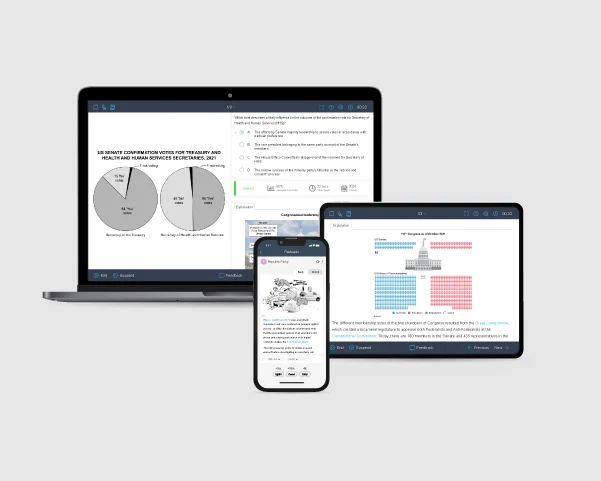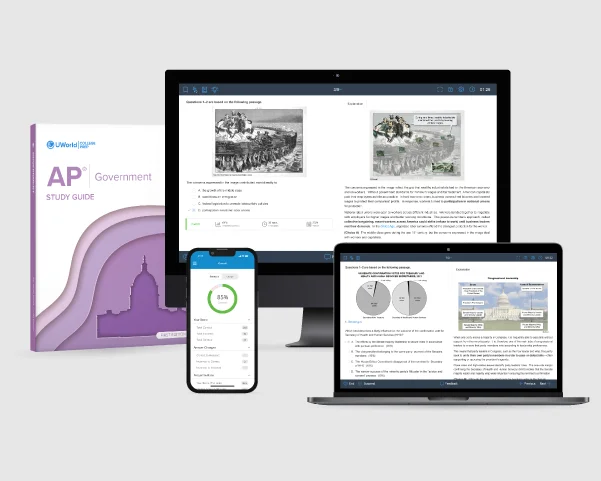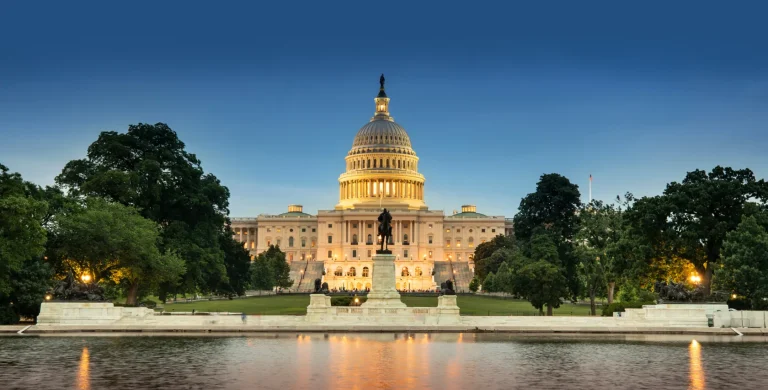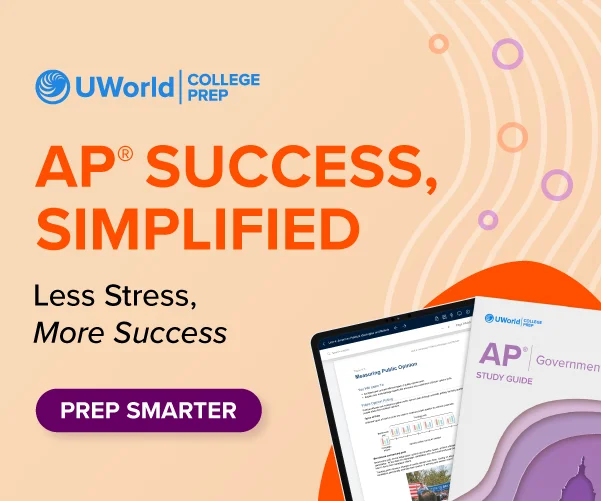This article provides a well-rounded course outline and includes AP Gov key concepts, skills, and topics you’ll need to master for your upcoming exam. Before we explore the course content, let’s address a couple of questions you might have about this course:
Is AP Gov a one-semester course and a dual credit course in high school?
No, AP courses are different from dual credit courses. AP U.S.Gov is not a dual credit course.
Which college course is equivalent to AP U.S. Government & Politics?
The AP U.S. Gov course is equivalent to a first-semester college course in American government and politics.
Is AP U.S. Gov a political science course?
Yes, AP Gov is an introductory-level political science course.
AP U.S. Government & Politics Units, Topics, and Key Concepts
The AP U.S. Gov course comprises two main components — the course content and disciplinary practices. As you progress through the course, you will develop certain disciplinary practices that you'll need to apply on the exam. These components will help you build a solid foundation for U.S. government and politics.
The course content is divided into AP Gov topics, units, and foundational documents. Each unit is based on key concepts, also known as big ideas, which provide the foundation for the course.
You can opt to take the AP U.S. Government exam even if you haven't taken any government or politics courses in high school. Nevertheless, remember that it is a heavy-weight course, and you'll need to prepare yourself by learning AP Gov key concepts and topics. In the following sections, we will explore the big ideas and the course units to help you understand AP Gov's structure.
The Five Big Ideas of AP U.S. Government and Politics
The course content is based on five key concepts that spiral through each of its units. While the units focus on teaching particular AP Gov topics, these big ideas are foundational to the U.S. Government and Politics.
You might ask, What are the 5 big ideas of AP U.S. Government & Politics? These big ideas are listed below to help you understand the course foundation. Let's see what they are:
Big Idea 1: Constitutionalism (CON)
The U.S. Constitution divides authority between the federal and state governments and creates a system of checks and balances between the several branches of government. The rule of law and a balance between majority rule and minority rights serve as the foundation of this system. Therefore, the body of laws and the Constitution are essential for American democracy to function. This key concept forms the first big idea of Constitutionalism (CON).
-
Big Idea 2: Liberty and Order (LOR)
Based on the U.S. Constitution, governmental laws and policies that balance order and liberty have been viewed differently. What is the Bill of Rights, and how does it impact American democracy? These aspects form the basis of the second big idea of Liberty and Order (LOR).
-
Big Idea 3: Civic Participation in a Representative Democracy (PRD)
Republicanism, individualism, and popular sovereignty are key elements of American law and policy making, and they rely on the participation of citizens. The third big idea of Civic Participation in a Representative Democracy (PRD) consolidates ideas regarding how political participation by individuals helps shape civil rights and liberties.
-
Big Idea 4: Competing Policy-Making Interests (PMI)
In a political system, numerous institutions and players develop and implement policies. This big idea encompasses several aspects of policymaking that include the role of the Supreme Court, the Constitution, political parties, and other political factors in understanding how certain ideologies shape policies and our daily lives.
-
Big Idea 5: Methods of Political Analysis (MPA)
Political scientists examine how many factors shape American political behavior, views, ideologies, and institutions over time using a variety of approaches. The fifth big idea, Methods of Political Analysis (MPA), is about relating observations to data and presenting an analysis to support or refute a political claim.
These five big ideas are distributed across the AP Government units to help you understand each concept thoroughly. Let's walk through each course unit to better understand how these big ideas and the course units intertwine to build a solid foundation in U.S. government and politics.
The Five Units of AP U.S. Government & Politics and Their Topics
The AP U.S. Gov course content is divided into course units, required foundational documents, and Supreme Court cases. The exam will assess knowledge of these components. Let’s explore the units that make up the AP Gov course.
The course has five AP Gov units, and as you progress through each one, you’ll come across one or more of the big ideas to reinforce core concepts.
Each unit is further divided into smaller topics. Knowing how these AP U.S. Government topics are organized, can help you identify your areas of strength and weakness, so you can decide which units and topics to focus on during your review.
In the following tabs, we’ve outlined all the units, topics, and big ideas you need to know about the AP U.S. Government and Politics course.
Unit 1: Foundations of American Democracy
Exam Weighting: 15 - 22 % | Classes ~ 8 - 16
Unit 1 begins this course by examining how the framers of the U.S. Constitution set up a structure of government intended to stand the test of time. In this unit, you’ll learn how governmental and political institutions function and the reasons for their behavior.
Big Ideas:
- Big Idea 1: Constitutionalism: Why are there debates about the balance of power between the federal and state governments?
- Big Idea 2: Liberty And Order: Is the Bill of Rights necessary? Why or why not?
- Big Idea 4: Competing Policy-Making Interests: How does the Constitution shape American government and politics by enabling multiple voices and institutions?
- To describe political principles, institutions, processes, policies, and behaviors that describe a democracy: Topic 1.1
- To identify and distinguish between the types of democracy based on political principles, institutions, processes, and policies: Topic 1.2
- How a government establishes and negotiates individual rights: Topic 1.3
- About the challenges of the Articles of Confederation leading to the formulation and ratification of the U.S. Constitution: Topics 1.4 - 1.5
- About the principles on which the American government operates: Topic 1.6
- How the Constitution understands federalism and the relationship between the states and the federal government structure: Topics 1.7 - 1.9
Unit 2: Interactions Among Branches of Government
Exam Weighting: 25 - 36 % | Classes ~ 14 - 28
In Unit 2, you’ll learn about policy-making and its many layers. You will also learn about the constitutional powers vested in multiple political bodies like Congress, the presidency, bureaucratic agencies, and the courts. You’ll learn how the idea of "checks and balances" promotes cooperation between these bodies and enables constitutional principles to function more effectively.
This unit will also introduce data analysis, where you'll need to identify patterns and trends, link them to political behaviors, and draw conclusions from that data.
Big Ideas:
- Big Idea 1: Constitutionalism: Which branch of government is the most powerful? Why? Are there checks and balances when one political party controls all three branches of government? Why or why not?
- Big Idea 4: Competing Policy-Making Interests: How has the evolution of government powers affected Americans and their daily lives?
- About Congress, its structures, powers, functions, and behavior: Topics 2.1 - 2.3
- About roles and powers of the POTUS and presidential communication: Topics 2.4, 2.7
- How the idea of "checks and balances" works on the presidency, and the expansion of presidential power: Topics 2.5, 2.6
- How the judiciary system functions, its political principles, policies, and legitimacy: Topics 2.8 - 2.11
- About the American bureaucratic system: Topics 2.12 - 2.14
- About policy-making and the branches of government: Topic 2.15
Unit 3: Civil Liberties and Civil Rights
Exam Weighting: 13 - 18 % | Classes ~ 13 - 26
Unit 3 focuses on prominent Supreme Court cases and helps you understand the relationship between the founding principles of our government and the balance between liberty and order. You will explore how these cases and their verdicts have provided the foundation for civil rights and liberties in the United States.
Big Ideas:
- Big Idea 1: Constitutionalism: How does the Constitution attempt to limit the abuse of government powers?
- Big Idea 2: Liberty and Order: What constitutional principles are vital in guaranteeing civil rights and civil liberties?
- Big Idea 3: Civic Participation in a Representative Democracy: How can individuals and groups help protect civil liberties and civil rights?
- Big Idea 4: Competing Policy-Making Interests: Why have Supreme Court decisions about civil liberties and civil rights changed over time?
- About the Bill of Rights, especially the First Amendment, which addresses freedom of speech, religion, and the press: Topics 3.1 - 3.4
- About the Second Amendment: the right to bear arms: Topic 3.5
- How the judicial system balances individual freedoms with public order and safety: Topic 3.6
- The process by which rights are incorporated: Topic 3.7
- How amendments are created in the judiciary with regards to the rights of the accused in court cases and the right to privacy: Topics 3.8, 3.9
- What social movements are and how the government responds to them: Topics 3.10, 3.11
- How the government finds a balance between majority and minority rights: Topics 3.12, 3.13
Unit 4: American Political Ideologies and Beliefs
Exam Weightage: 10 - 15 % | Classes ~ 11 - 22
Unit 4 delves into how public attitudes and belief systems change over time. You’ll also learn how political scientists measure and analyze those changes to understand American attitudes about government and politics. This analysis will help you understand an individual's role in the political system and how that influences the creation of public policies. Additionally, you’ll discover how these changing attitudes impact political parties and patterns of political participation.
Big Ideas:
- Big Idea 4: Competing Policy-Making Interests: How do our core beliefs about the role of government affect our behavior? How does our perception of freedom shape our opinions?
- Big Idea 5: Methods of Political Analysis: Why are some opinion polls better? How can policy-makers use information from political science to make decisions?
- American attitudes toward government and politics: Topics 4.1, 4.2
- Changes in political ideology and how political events factor in that change: Topics 4.3, 4.4
- How to evaluate and measure public opinion: Topics 4.5 - 4.6
- Ideologies of political parties: Topic 4.7
- How political ideology affects policy-making: Topic 4.8
- The relationship between ideology, economic, and social policies: Topics 4.9 - 4.10
Unit 5: Political Participation
Exam Weightage: 20 - 27 % | Classes ~ 9 - 18
In this final unit of AP Gov, you’ll explore the relationship between citizen participation and policy-making. Political ideologies affect policy-makers and determine political decisions that impact citizens' daily lives. You’ll learn about different perspectives on these political ideologies and principles, and will be able to support or refute those claims with evidence.
Big Ideas:
- Big Idea 3: Civic Participation in a Representative Democracy: Why do some people participate in government while others do not? How does your social network affect your political beliefs?
- Big Idea 4: Competing Policy-Making Interests: Why might you join a political party? Why might you choose not to?
- Big Idea 5: Methods of Political Analysis: How might identity contribute to how one participates in American government?
- About voting rights, voter turnout, and voter behavior: Topics 5.1. 5.2
- Political parties and their behavior: Topics 5.3, 5.4
- Third-party politics: Topic 5.5
- How special interest groups affect policies: Topics 5.6, 5.7
- How the president is elected: Topic 5.8
- How Congress is elected: Topic 5.9
- Political campaigns and how they are financed: Topics 5.10, 5.11
- Role of media in shaping political perspectives: Topics 5.12, 5.13
Remember to go back and review the big ideas, units, and key topics as you move forward in the course. Timed practice tests will improve time management and help you retain course concepts effectively. You can also opt for a premium study resource like UWorld's U.S. Government course, which comes with a study guide and QBank to help you prepare smarter and faster.

Required Foundational Documents and Supreme Court Cases
You are required to study the AP Government units parallel to various foundational documents and landmark Supreme Court cases in order to fully understand the inner workings of the American political system.
The foundational documents serve as the bedrock for the concepts learned in the AP Gov units. The AP Gov course has nine foundational documents:
- Federalist No. 10
- Brutus No. 1
- The Declaration Of Independence
- The Articles of Confederation
- The Constitution of The United States (including The Bill Of Rights and subsequent amendments)
- Federalist No. 51
- "Letter from Birmingham Jail" (By Martin Luther King, Jr.)
- Federalist No. 70
- Federalist No. 78
In addition to these documents, you’ll study fifteen Supreme Court cases to understand how our constitution functions. These milestone cases serve as examples of how the ideas of democracy, federalism, and individual rights are applied in real-life scenarios. These cases include:
- Mcculloch v. Maryland (1819)
- United States V. Lopez (1995)
- Engel V. Vitale (1962)
- Wisconsin V. Yoder (1972)
- Tinker V. Des Moines Independent Community School District (1969)
- New York Times Co. V. United States (1971)
- Schenck V. United States (1919)
- Gideon V. Wainwright (1963)
- Roe V. Wade (1973)
- McDonald V. Chicago (2010)
- Brown V. Board Of Education (1954)
- Citizens United V. Federal Election Commission (2010)
- Baker V. Carr (1962)
- Shaw V. Reno (1993)
- Marbury V. Madison (1803)
These cases are included in the AP U.S. Gov course content to help you understand how our Supreme Court interprets various policies, bills, and constitutional provisions in real-life contexts.
AP U.S. Government and Politics Course Disciplinary Practices
AP U.S. Government and Politics disciplinary practices describe the skills you will acquire while exploring course concepts. The College Board® categorizes four integral disciplinary practices for success on the exam:
-
Concept Application
The first disciplinary practice requires you to identify, describe, and learn about political principles, institutions, processes, policies, and behaviors. As you proceed through the chapters, you will need to apply and explain these concepts and processes to scenarios in context.
-
SCOTUS Application
Under the second practice of the SCOTUS (Supreme Court of the United States) application, you will need to identify the facts, reasoning, decision, majority opinion, and dissenting opinion of the required Supreme Court cases. You will also learn to describe and explain how certain political concepts are applied in Supreme Court decisions.
-
Data Analysis
The third disciplinary practice involves analyzing and interpreting quantitative data in tables, charts, graphs, maps, and infographics. You’ll learn to describe the presented data and draw conclusions from its patterns and trends.
As you progress through the AP Government units, this skill will equip you to describe certain political principles, institutions, processes, policies, and behaviors from data. In time, you will also learn to identify possible data limitations.
-
Source Analysis
Source analysis involves reading, analyzing, and interpreting foundational documents, as well as other text-based and visual sources. You’ll need to explain how a cartoon, map, or infographic depicts political principles, institutions, processes, policies, and behaviors.
-
Argumentation
The fifth skill, argumentation, involves making a defensible claim in an essay. You should be able to support your argument using relevant evidence and explain its significance to justify the claim or thesis.

References
- AP® U.S. Government and Politics. (2023). apcentral.collegeboard.org. Retrieved December 16, 2024, from https://apcentral.collegeboard.org/media/pdf/ap-united-states-government-and-politics-course-overview.pdf?course=ap-united-states-government-and-politics
- AP® U.S. Government and Politics Course and Exam Description. (2023). apcentral.collegeboard.org. Retrieved December 16, 2024, from https://apcentral.collegeboard.org/media/pdf/ap-us-government-and-politics-course-and-exam-description.pdf?course=ap-united-states-government-and-politics
- AP United States Government & Politics Exam – AP Students. (n.d.). apstudents.collegeboard.org. Retrieved December 16, 2024, from https://apstudents.collegeboard.org/courses/ap-united-states-government-and-politics/assessment
Frequently Asked Questions (FAQs)
How many units are there in the AP U.S. Government & Politics course?
What is the hardest topic in AP U.S. Government & Politics?
Read More About the AP U.S. Government & Politics Exam
AP U.S. Government Study Plan & Tips
Want to score a 5 on the AP U.S. Government and exam? Our expert-designed study plan offers proven tips, strategies, and resources to help you ace your exam with confidence.
AP U.S. Government Exam Format
Curious about the AP Gov exam format? Check out our guide to the AP U.S. Government exam structure, including question types, sections, and everything that you need to know!
AP U.S. Government Scoring Guide
Curious to know about the scoring system for the AP U.S. Government and Politics exam? This guide discusses how the different section scores contribute to your final score.
Best AP U.S. Gov Study Guide Comparison
Compare the best AP Gov study guides! See how Kaplan, Barron's, and Princeton Review stack up against UWorld for comprehensive exam prep.
Best AP U.S. Gov Prep Course Review
Discover the best AP U.S. Gov prep courses! This in-depth review helps you compare options and pick the course that meets your needs.
How to Self-Study for AP U.S. Gov
Learn effective tips and strategies to self-study for the AP U.S. Gov exam. Build confidence, master core concepts, and achieve a high score independently too.



